
"Dems Fraud": Far Right and Data Voids on DuckDuckGo.com
Our increased Internet use and dependance on Google are not entirely good and convenient things, especially due to the manipulation of data voids. Digital media phenomena such as filter bubbles, created by algorithms, can spread fake news and misinform people. On search engines, one type of risk comes from data voids.
In this article I will give insight into data voids and the danger that they pose in the context of the U.S. presidential election. Misinformation and propaganda can easily spread through the internet, and understanding how data voids work is important when dealing with junk news online.
What are data voids?
Golebiewski and boyd (2018) define data voids as the lack of quality results search engines provide for certain search terms: "There are many search terms for which the available relevant data is limited, nonexistent, or deeply problematic. ... We call these low-quality data situations ‘data voids.'" Put simply, looking up something that is barely searched for will bring up no or limited results. This lack of results is a data void. It can then be filled up by following search engine optimization (SEO) rules - having knowledge of how SEO works is enough to make fake news accessible. Golebiewski and boyd (2018) further explain that "Those seeking to manipulate information often prepare to use these terms by creating websites and leveraging basic search engine optimization techniques."
In their report, Golebiewski and boyd stress the vulnerability that data voids pose as they are filled with low-quality content. This is connected to a rising trend in "online misinformation to encourage users to search for a topic for which the motivated manipulator knows that only one point of view will be represented" (Golebiewski & boyd, 2018).
In this article I will use DuckDuckGo's data voids as a case study to give more insight into how misinformation makes its way through the internet. An effective way of finding data voids is to pay attention to emerging search terms or breaking news (Golebiewski & boyd, 2018). For instance, Covid-19 or the 2020 U.S. elections, have not been searched for before. As they become relevant, the battle to make it on top of the search results starts: fake news spreaders want to slip into Google's search results. “Media manipulators have learned to capitalize on missing data, the logics of search engines, and the practices of searchers to help drive attention to a range of problematic content.” However, we have seen Google make an effort to combat fake news about the Covid-19 pandemic, reserving the top results for legacy sources. Google does their best to stop data voids, thus, I have chosen DuckDuckGo because they claim to be unbiased, fair and neutral, meaning that they are not regulating what appears in their search results.
DuckDuckGo's reputation
DuckDuckGo is an alternative search engine that promises privacy, claiming that it does not track or store private information like Google does. The aim of DuckDuckGo is to diminish the existence of filter bubbles and echo chambers. Filter bubbles are the personalized ecosystems of information collected and sorted by algorithms as a consequence of personalized internet surfing. DuckDuckGo shows the same results to all the users searching for the same term and therefore seems like a neutral, untouched search engine experience.
This positive portrayal of DuckDuckGo as unbiased attracts people, especially because Google has recently received criticism regarding its bias. However, the search engine service has become open season for far-right junk news and conspiracy theories. We have recently seen a trend of the New Right creating or moving to alternative digital media platforms: from YouTube to bitchute.com and banned.video, from Facebook to Gab.ai and Parler, and finally from Google to DuckDuckGo. The New Right has created a parallel internet, which is seen as free of censorship and leftist bias.
DuckDuckGo has been praised by tech experts, however, an in-depth look reveals the hijack by the Right Wing. One notable example is that many alternative media personalities, such as Paul Joseph Watson, are using and endorsing DuckDuckGo.
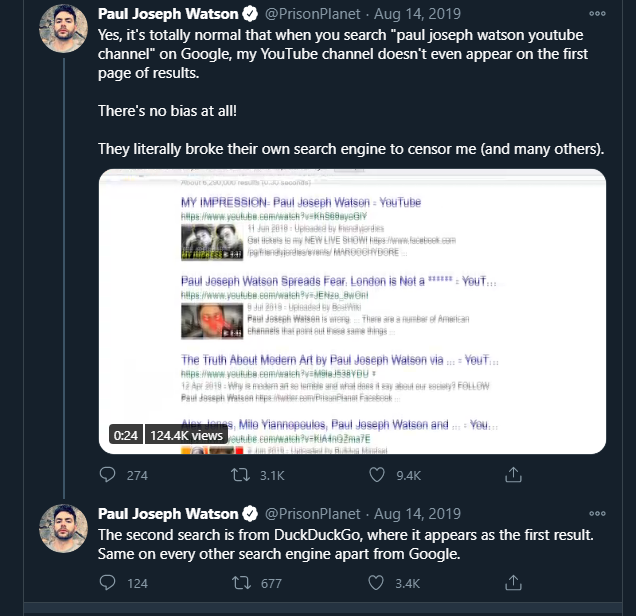
Paul Joseph Watson's tweet regarding DuckDuckGo VS Google's accuracy
"Dems Fraud" search results on DuckDuckGo.com
Going down the rabbit hole of DuckDuckGo opens up a realm of data voids ready to be filled with junk news. In many cases, DuckDuckGo results do not contain official or legacy media sources. Furthermore, DuckDuckGo's ideals of privacy and neutrality can lead to the unregulated spread of conspiracy theories and misinformation in their search results.
When researching the U.S. 2020 elections, I acquainted myself with New Right discourses by watching streams from banned.video. On this platform, the main discourse is that the elections have been rigged and that the "dems" did it. Thus, searching "dems fraud" on DuckDuckGo did indeed turn out to be a data void, as no official sources were shown as results. This means that fake news spreaders can easily direct people to their biased version of the elections turned just by asking them to search for "dems fraud."
The mentality of "it's there, just Google it" is dangerous when people start taking everything that circulates on the internet seriously. However, as Google is seen as the "evil censoring Big Brother" by the New Right (because Google tries to combat junk news), the shift to DuckDuckGo has created the perfect environment for spreading conspiracy theories.
The next two screenshots illustrate the search results for 'dems fraud' in DuckDuckGo. According to Golebiewski and boyd (2018), this data void can be categorized as a "strategic new term." It is unlikely that the search results for dems fraud would contain any official sources, as it is a highly disputed situation. However, conspiracy theorists and New Right activists have created an optimized information ecosystem around dems fraud and similar search inquiries.
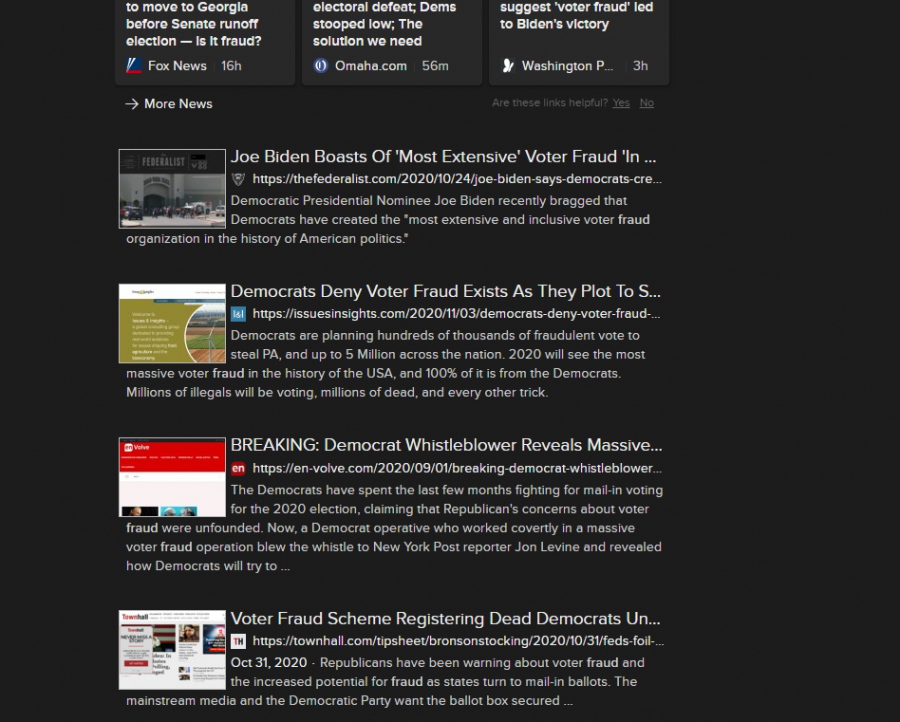
Dems Fraud on DuckDuckGo
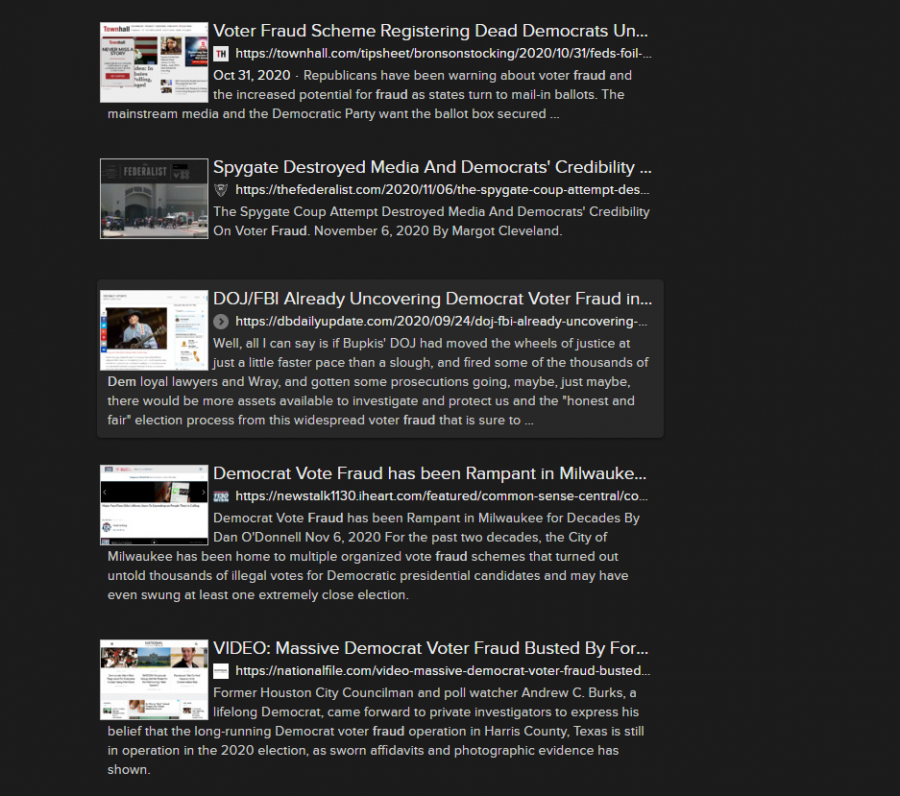
Dems Fraud on DuckDuckGo #2
The results link to articles that try to reveal or enforce the idea that the democrats rigged the elections. When clicking on these sources it becomes clear that they belong to obscure and low quality sites that do not provide substantiated evidence and sources. However, the goal is achieved. The search results link to articles in favor of this constructed reality and to no articles claiming otherwise. Furthermore, the auto-filler of DuckDuckGo's auto-completion also links to data voids. Just typing in "dems" leads to two problematic search termsresults: "dems worrying" and "dems panicking."
The problem with the content that DuckDuckGo indexes is that it looks like news, but it is not. The figure below shows the first search result for the "dems panicking" search query. PJ Media is a known subscription based, right-wing website. The irony is that PJ Media is also known for falsely claiming that Google is manipulating their search results to only show left-leaning news outlets.
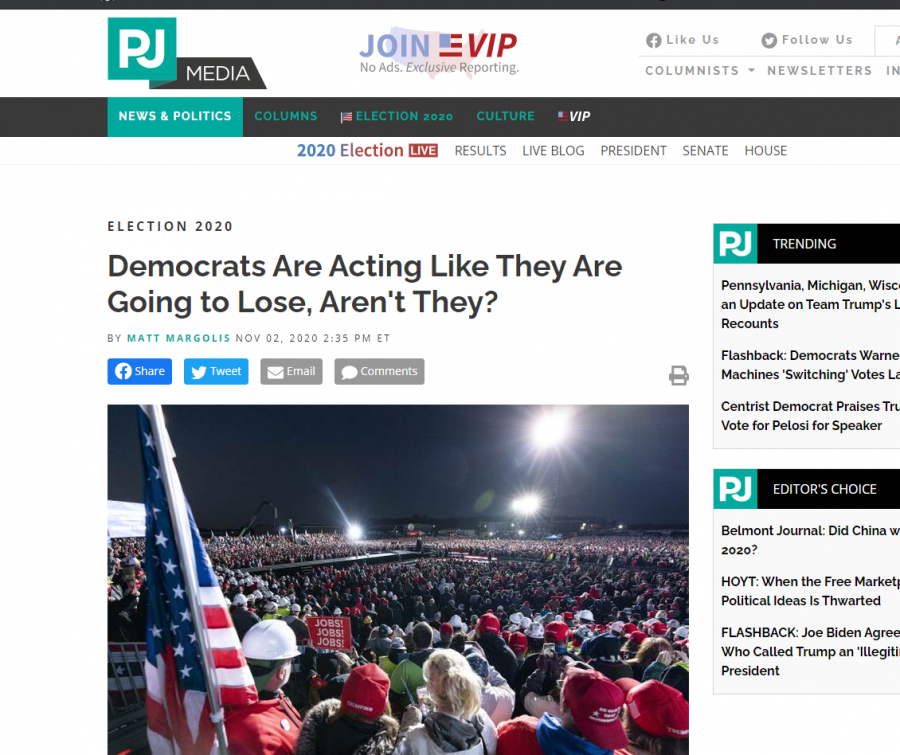
PJ Media
This data void is perhaps the effect of New Right thinkers who search for and engage with these stories and conspiracies surrounding the elections. New Right activists promote discourses of democrats' fraud, which leads to people searching for it. This happens especially on DuckDuckGo, as it is preferred by the New Right because it is an "unbiased" alternative to Google. Furthermore, the influence of right-wing activists can easily be spotted in DuckDuckGo's auto-completion. The dems panicking search term comes from right-wing discourse, as illustrated in the picture below. By constantly distributing this hypothesis of democratic fraud, right-wing activists direct their audience to such data voids.
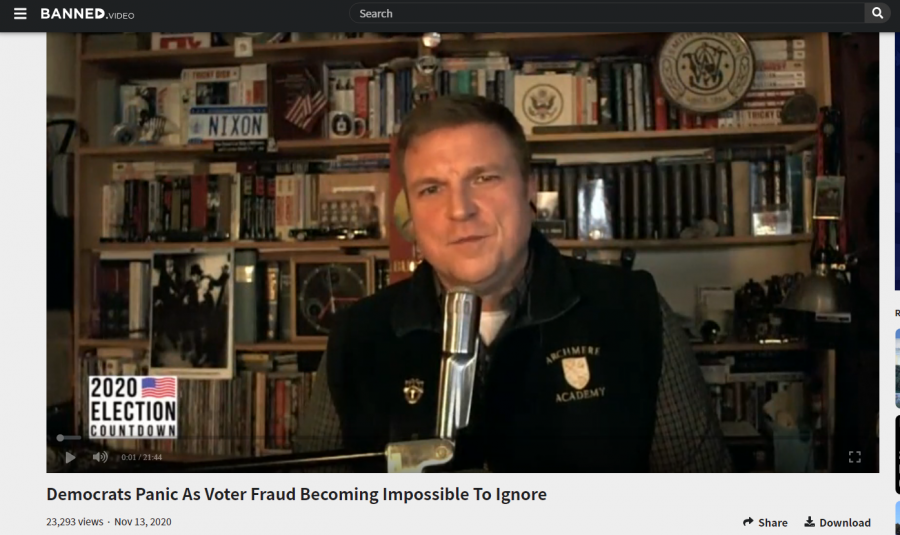
On banned.video, the idea that the democrats are in full-panic is enforced
On Junk News
Data voids can become problematic when they are filled with misinformation and fake news. Understanding the phenomenon of fake news is important for fully grasping the risks that such data voids pose to rational debate in democracies. The information that New Right activists typically spread is not fake, per se, as they make use of references and start from a seed of truth. However, these activists then shape and twist these stories to fit their own agendas (Maly, 2019). The best term to categorize New Right news then is Venturini's concept of junk news (2019). According to Venturini, junk news is low-quality "news" designed to become viral, which contains little truthful content and can be used to misinform people because of the attention it gets (2019).
Venturini explains why junk news can be detrimental to a democracy: "Junk news’ is dangerous not because it is false, but because it saturates public debate, leaving little space to other discussions, reducing the richness of public debate and preventing more important stories from being heard" (2019). In the case of DuckDuckGo data voids, they are saturated with New Right results, leaving no room for different views.
"Junk news’ is dangerous not because it is false, but because it saturates public debate, leaving little space to other discussions, reducing the richness of public debate and preventing more important stories from being heard." - Venturini, 2019
Combating junk news is a challenge to today's democracy because the people who spread it strongly believe that they are only telling the hidden truth. Living in a post-truth era comes with the risk of multiple "truths" or 'alternative facts'. As much as Donald Trump calls the mainstream media fake news, so do the mainstream media when they call out Far Right activists. This leads to two sides pointing at each other and further division, a division that also takes place on the Internet. There is a solution to data voids though, and that is filling them with official, reliable news articles that can show up at the top of search results. In the case of Dems Fraud data void, the top results should also contain news articles that claim otherwise, which Google does (see below).
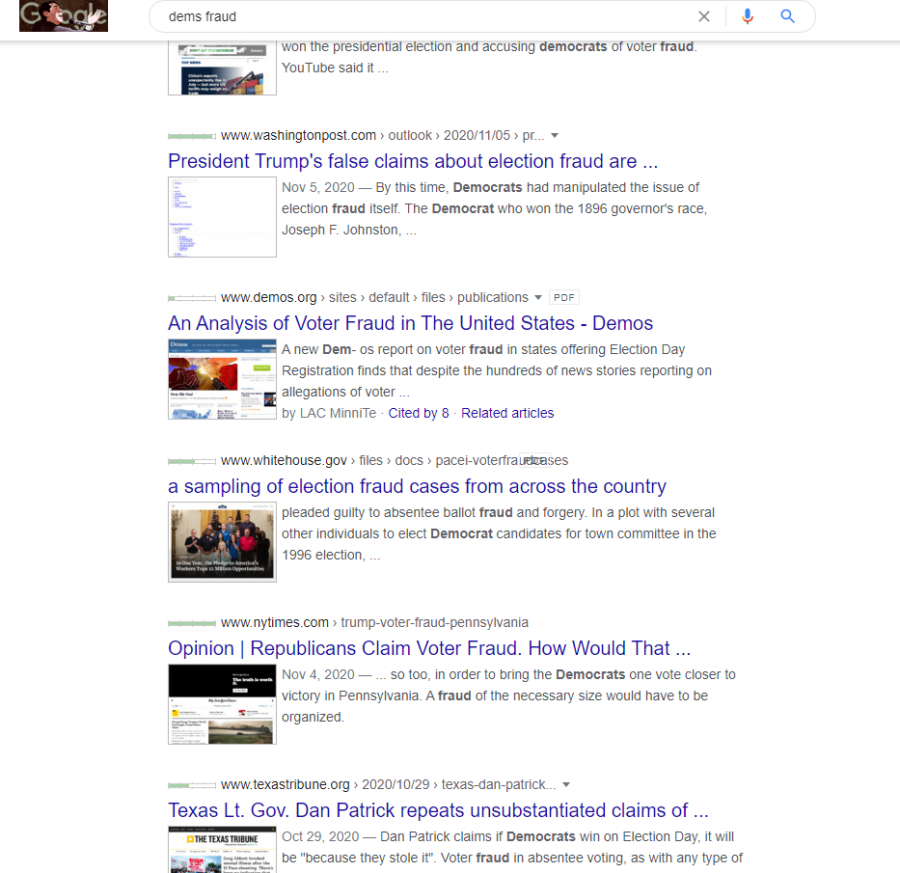
Google shows official sources disapproving of the democrats fraud claim
DuckDuckGo's data voids
DuckDuckGo's naive ideal of a neutral, bias-free search engine that cares about user privacy has been stained with data voids filled with Far Right junk news. As much as they try to combat filter bubbles, they have become a right-wing filter bubble. This is mainly because the New Right has shifted from mainstream Internet platforms such as Google to alternative digital media as a response to "censorship". Consequently, DuckDuckGo has attracted a New Right user base, leading to an increase in New Right content. Data voids are problematic because they distribute junk news, which saturates the hybrid media system and gives no room to differing views. If DuckDuckGo wants to stick to their ideal of a neutral and unbiased search experience, then they ought to consider regulating their site and implementing measures to deal with problematic content.
The dems fraud data void on DuckDuckGo is the result of New Right activists propagating this notion through alternative media. Engaging with content coming from banned.video directs people into this data void, enforcing the idea that the elections were 'stolen'. Showing no other results that claim otherwise leads to people blindly believe what they hear from right-wing activists.
In this way, the userbase of DuckDuckGo can easily be misinformed and tricked to believe junk news. This is dangerous especially to the users of DuckDuckGo who have no political affinities and end up in a data void simply by typing in "dems." However, the problem is bigger than just the existence of data voids. It seems more and more that there are two "internets": The mainstream internet that consists of established companies, such as Google, Facebook, Apple, and Amazon, that try to protect their users from junk news and the alternative internet created by the New Right in response to what they deem censorship.
References
Golebiewski, & boyd, d. (2018). Data Voids: Where Missing Data Can Easily Be Exploited. Data & Society.
Maly, I. (2019). The coronavirus, the attention economy and far-right junk news. Diggit Magazine.
Venturini, T. (2019). From Fake to Junk News, the Data Politics of Online Virality. In D. Bigo, E. Isin, & E. Ruppert (Eds.), Data Politics: Worlds, Subjects, Rights. London: Routledge.